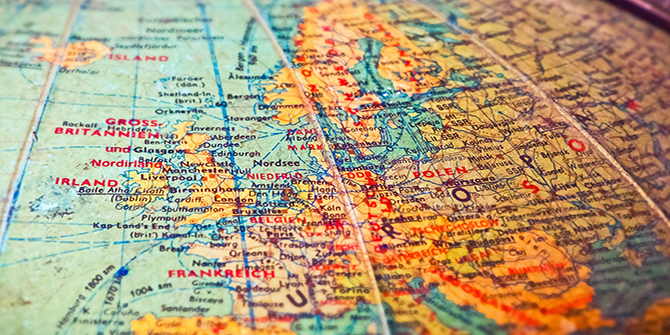 The meaning of Brexit is yet to become clear. But if Brexit means leaving the customs union of the European Union, Thomas Sampson looks at what it might meant for the UK to pursue its own trade policy for the first time since joining the EU in 1973.
The meaning of Brexit is yet to become clear. But if Brexit means leaving the customs union of the European Union, Thomas Sampson looks at what it might meant for the UK to pursue its own trade policy for the first time since joining the EU in 1973.
An independent trade policy presents both challenges and opportunities. The most important challenge would be to reach a new trade agreement with the European Union (EU). The UK has yet to decide what relationship with the EU it wants following Brexit. But whatever it chooses, the government’s ability to achieve its goals will depend on the success of its negotiating strategy.
What strategy should the UK adopt to secure its objectives in future trade negotiations? A successful strategy must be grounded in a clear understanding of why countries negotiate trade agreements and how negotiations are conducted.
When a country sets trade policy unilaterally, it does not account for how its choices affect the rest of the world. But because countries are interdependent, the effects of trade policy do not stop at national borders. In the language of economics, trade policy generates international ‘externalities’. And frequently these externalities lead to ‘beggar-my-neighbour’ effects, which make other countries worse off by lowering their terms of trade or reducing inward investment.
By negotiating trade agreements, countries can internalise the externalities resulting from international interdependencies, avoid damaging trade wars and improve welfare. Importantly, this is true regardless of whether governments’ policy goals are motivated by the desire to maximise economic output, the wish to protect particular groups of workers and firms, or the pursuit of other social objectives. Whenever policies have international spillovers that governments fail to internalise, there is scope for international agreements to make all countries better off.
To reap the gains from international coordination, trade agreements require governments to give up unilateral control over some policies in exchange for other countries doing the same. For example, members of the World Trade Organisation (WTO) give up the right to use import quotas and production subsidies and agree limits on the tariffs that each country can charge on imports from other members.
Understanding the purpose of trade agreements has immediate implications for how trade negotiations are conducted. Trade negotiations are not about countries identifying a common objective and working together to achieve it. They are not a cooperative endeavour.
Instead, trade negotiations are a bargain between countries with competing objectives. Each country must give up something it values in order to obtain concessions from other countries. The realisation that negotiations are a bargaining process between countries with conflicting goals suggests four principles the UK should adopt to guide its trade negotiation strategy:
- You Get What You Give
To reap the benefits of trade agreements, the UK must be willing to give its trading partners something they value. In general, the more countries are willing to concede and the more policy control they give up, the bigger are the potential gains from reaching an agreement.
An important question that the UK faces is what it is willing to give the EU in return for the EU allowing UK services firms to participate in the Single Market. Unless the UK makes a sufficiently attractive offer, the EU will take the opportunity Brexit presents to impose new barriers on UK services exports.
The fact that free trade agreements are based on mutual concessions also makes unilateral tariff liberalisation a less attractive policy because it would involve the UK giving away a potentially important bargaining chip.
- Where Negotiations Start from Matters
The outcome of any bargaining game depends on where negotiations start from. Trade agreements are no exception. The policies each country will adopt if no agreement is reached provide a reference point – or ‘threat point’ – for the negotiations. Countries make concessions starting from this reference point.
It is unclear whether the reference point for UK-EU negotiations would be the status quo where the UK is a member of the Single Market or trade under WTO rules. Starting from the status quo, the UK would have to negotiate the right to impose restrictions on immigration from the EU. Starting from WTO rules, the UK would not need to negotiate immigration restrictions, but would need to negotiate access to the Single Market.
Before any trade negotiations between the UK and the EU take place, there will have to be an agreement on what the reference point is. The UK government should seek a reference point that helps it to achieve its post-Brexit objectives.
- Bargain from a Position of Power
Bargaining power affects the outcome of trade negotiations. Countries that have little bargaining power are less likely to achieve their objectives. Unfortunately, the UK is starting from a weaker position than the EU. Because UK-EU trade accounts for a much larger share of the UK’s economy than the EU’s economy, the UK needs a deal more than the EU does.
The weakness of the UK’s position is exacerbated by the two-year time limit on exit negotiations under Article 50. As the two-year limit approaches, the UK will become increasingly desperate to obtain an agreement. There are two steps that the UK should take to improve its bargaining position. First, delay triggering Article 50 until the government has decided its post-Brexit objectives and EU leaders are ready to start negotiations. Theresa May’s commitment to invoke Article 50 in early 2017 before the French and German elections weakens the UK’s position because the EU will not be able to participate in meaningful negotiations until after these elections.
Second, the UK’s immediate objective after invoking Article 50 should be to neutralise the two-year time limit by agreeing a transition arrangement to govern UK-EU trade relations during the period between when the UK leaves the EU and when a longer-term agreement is concluded. Returning to the principle that you only get what you give, the UK needs to decide what it is willing to offer the EU in return for a transition agreement.
- Invest in Negotiating Capacity
Trade agreements involve many simultaneous policy changes making it difficult to analyse their economic consequences. Smart negotiators use this uncertainty to their advantage by ensuring they are better informed than their opponents about who stands to gain and who stands to lose from any policy proposal.
Having not participated in trade negotiations for the past 40 years, the UK currently has very little negotiating capacity. To become a smart negotiator, the UK needs to invest heavily in four areas of expertise: trade lawyers to conduct negotiations; diplomats to provide information on the objectives and strategies of its negotiating partners; business intelligence to understand how firms will be affected by different policies; and trade economists to quantify the welfare effects of proposed trade agreements.
Since the UK joined the EU in 1973, trade policy has played a minor role in UK politics. Now it’s back. Much has and will continue to be written about what the objectives of post-Brexit UK trade policy should be. But whether the UK is able to achieve the objectives it eventually chooses, will depend on the success of its negotiating strategy. By adopting these four principles the government can ensure it makes the best of a bad hand.
______
This article is a summary of the CEP BREXIT09 Analysis ‘Four Principles for the UK’s Brexit Trade Negotiations’ which is available to download from here. The Centre for Economic Performance (CEP) is a politically independent Research Centre at the London School of Economics and Political Science.
About the Author
 Dr Thomas Sampson joined the Centre for Economic Performance at the LSE in 2011. He is an Assistant Professor in the Department of Economics at LSE. Thomas works on international trade, growth and development. His research analyzes how different types of firms and workers are affected by globalisation.
Dr Thomas Sampson joined the Centre for Economic Performance at the LSE in 2011. He is an Assistant Professor in the Department of Economics at LSE. Thomas works on international trade, growth and development. His research analyzes how different types of firms and workers are affected by globalisation.








I think EU leaders who are being overly bullish are also being false in their need to “punish” the UK for leaving.
It’s about pragmatism, and being able to trade with a large economy on its doorstep. Of the bigger economies, the UK has arguably the highest living standards, and this evidently is a large market to trade with.
You’re right, the EU has the upper-hand, but pragmatism will in my mind lessen a need to “penalise” the UK for daring to leave the EU. The large EU-based firms such as Siemens, BMW, Total, BNP Paribas, Santander, Repsol, Phillips, Fiat, Ikea, Nokia, etc. all would want to continue trade (for sales/revenues alone). Whilst some may review doing business in the UK post-Brexit, it’s in their interest to ensure all markets are pliant for trading in some form.